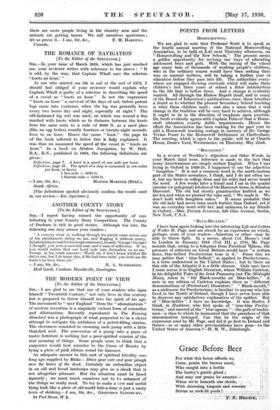We are glad to note that Professor - Scott is to
speak at the fourth annual meeting of the National Homecrofting Association, to be held, at.3.45 next Thursday afternoon, on " Homeciofting and the New Schools." The present seems a golden opportunity for revising our Ways of educating adolescent boys and girls. With -the raising of the school age many tens of thousands of working people's children, who in the ordinary course would have been seeking their way as manual workers, will be taking a further year of education before they pass into life. The authorities every- where are engaged devising curricula which will make these children's last three years at school a fitter intrOduction to the life that is 'before them. And a change is evidently wanted. All through the Hadow Report itself, and in many of the Board of Education's publications since, there breathes a doubt as to whether the present Secondary School teaching is what these children need ; and also a sense that a real change in the tradition will be- very hard to achieve, although it ought to lie in the direction of emphasis upon practice. Dr. Scott evidently agrees with Captain Petavel that a Home- croft education exactly fulfils requirements. Hence the effort the Association has been making for the past year_ to add a Homecroft teaching cottage in memory of Dr. George Vivian Poore to the Homecroft Settlement at Cheltenham. The meeting, which is open to the public, will be at Church House, Dean's Yard, Westminster, on Thursday, May 22nd.
BOUGHTEN."
In a review of Weekley's Adjectives and Other Words, in your March 22nd issue, reference is made to the fact that many Americanisms are simply archaic English. When I was living in Oxford in 1920-21,`I happened to use the adjective " boughten." It is not a common word in the north-eastern part of the States nowadays, I think, and I do not often- use it, but my hosts (a college dean and his wife) had never heard the word. A few weeks later a friend and I sat in the quaint circular (or polygonal) kitchen of the Harcourt Arms, in Stanton Harcourt. The old but sturdy grandmother knitted as we ate tea and when we praised the cake said, " We made it. We don't hold with boughten cakes." It seems probable that the old lady had never been much further than Oxford, yet; it was an everyday word with her,- and unknown to my friends in Oxford.—MRs. PIETER JUCHTER, 349 Glen Avenue, Scotia, New York, U.S.A.
" BLUE-BEY-J.1-Rn."
I have been again looking into the interesting Life and Letters of Walter H. Page, and am struck by an expression on which, perhaps, some of your readers—American or other—may be able to throw light. In a memo. about Col. House's visit to London in January, 1916 (Vol. III, p. 279), Mr. Page records that, owing to a telegram from President Wilson, the pressure of criticism on Great Britain would have "a certain fierce, blue-bellied Presbyterian tone in it." From this we may gather that " blue-bellied," as applied to Presbyterians, is a term understood in the United States ; but to those ofi this side of the Atlantic it is a little obscure. Only once have I come across it in English literature, where William Carleton, in his delightful Tales of the Irish Peasantry (see The Midnight Mass), refers to " the Black-mouths an' Blue-bellies." A note in my edition of Carleton explains these as " different denominations of (Protestant) Dissenters." " Black-mouth," as a nickname for Presbyterians, is familiar to anyone who-has lived in the North of Ireland, though I have never been able to discover any satisfactory explanation of the epithet. But of " Blue-bellies " I have no knowledge. It was Butler,: I think, in Hudibras, who first spoke of " true-blue Presby- terian," and sneered at the " blue-aprons "—the garb of trades- men—a class to which he insinuated that the preachers of thiit denomination belonged. Can this be the origin of ' the expression used by Mr. Page, and did it go first to Ireland and thence—as so many other provincialisms have gone—to the United States of America ?—H. M. W., Edinburgh.














































 Previous page
Previous page